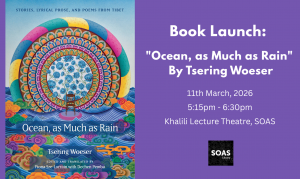High Peaks Pure Earth has translated a blogpost by Woeser that was originally written for broadcast on Radio Free Asia on March 1, 2011 and posted on her blog on March 4, 2011.
Woeser’s blogpost is timed to coincide with Losar, Tibetan New Year. This year, there has been much discussion amongst Tibetan netizens on the regional variations when it comes to celebrating Losar, as well as the conflict in celebrating Chinese New Year when the timing does not coincide with Losar. For more on this topic, see the previous posting here on High Peaks Pure Earth titled “One Tibet, Many Tibetan New Years”.
A few days ago, some people I had just made friends with made their way from Chengdu to their hometown somewhere in eastern Tibet to celebrate Losar, the Tibetan New Year. I asked them if they celebrated both Chinese New Year and Losar or whether they just chose one. They said that the people just like to celebrate Losar whereas their work units placed more emphasis on Chinese New Year. People in their hometown rely on livestock and also agriculture to make a living and it is hence different from places like Amdo and Kham; and with regards to New Year celebrations, they by no means have to celebrate Chinese New Year.
In the past few years, there has been a lively debate among Tibetans on the internet about the displacement of New Year’s celebrations. One of the opinions is that “the displacement of New Year’s celebrations in Amdo (Gansu, Qinghai) and Kham (Tibet) was caused by the historically, geographically and climatically transformed environment, but that the actual atmosphere of the celebrations has become more Tibetan”. I have always believed that since we know that our New Year has been somewhat displaced, we should try to gradually replace it; yet, after engaging in profound discussions and thus gaining a more comprehensive understanding, I now think that it is not really a question of displacement and replacement, but whether the choices we make are imposed or natural.
Over 90 years ago, the Minister for Qinghai, Sichuan, and Yunnan, stationed in Tibet, Zhao Erfeng, instigated a brutal massacre in the Kham region, killing many Tibetan monks, thus promoting the system of “Liuguan”; he regarded the transformation of Tibetan folk customs as extremely important, calling it the “opening-up of a culture” and the “reformation of old habits”, which included forcing Tibetan disciples to study Mandarin and making Tibetan families take on Han Chinese family names. As a result, in today’s Kham region we find many people with Han Chinese surnames, of which many originate from that period. It also included making people celebrate Chinese New Year, Mid-Autumn Festival as well as putting an end to sky burials, instead burying the deceased in the ground. In the Amdo region, the 40-year-long reign of the Ma Bufang Hui nationality warlord family forced Tibetans to intermarry and to change their religious beliefs; it also spread and popularised Chinese New Year as well as other festival traditions, including dragon, lion and lantern dances.
The forced changes back then have turned into more soft changes today; it seems that they are better at capturing people’s weaknesses. For example, two years ago, the Tibetan Losar and the Chinese lunar New Year happened to be at exactly the same time, which meant that people could celebrate them together and it saved them from the problem of having to choose. But this year, both festivals are one whole month apart and as far as I know, Kardze Prefecture gave people 7 days holiday for Chinese New Year, but only 3 days for Losar. Not to mention that this is already a differentiation, they even decided to add those 3 days to the 7 days of Chinese New Year vacation, leaving 10 days of vacation around Lunar New Year and none for Losar.
This decision was in favour of those people who wanted to have a long holiday; my family in Dartsedo, for example, were happy to use those 10 days to go to Chengdu and enjoy themselves. It also didn’t matter to them that when it came to Losar celebrations, they were busy working and no festive emotions or atmosphere came up. In fact, many people, I am referring to those living in the cities and towns, already entertain an indifferent attitude towards the meaning of Losar. Yet, the above-mentioned decision has certainly let to the fading away of Losar. No matter whether intentionally or not, this is bound to weaken Losar, making it much less important than Chinese New Year.
However, on the other hand, as we can see on the internet, there are some young Tibetans who believe that incorporating some customs of Chinese New Year into Tibetan people’s lives is not at all inappropriate. For example, those triple antithetical couplets written in golden letters on red background are originally simply an imitation of the Han Chinese couplet, neither fish nor fowl; yet, it’s not simply about “likeness”. It is important to know that all the loss is first reflected in the details; every single detail embodies a little bit more loss until in the end, everything is lost.
I am not a narrow-minded nationalist. I realised that on this year’s Chinese New Year’s Eve, among the Happy New Year Messages I received, most of them were from Tibetans from Amdo and Kham; and there were not only MMS containing Tibetan songs and dance, there were also some SMS from monks reciting prayers and the classic scriptures. This admittedly conveyed a “pure Tibetan atmosphere”, but at the same time, it felt somewhat peculiar. Just like Wang Lixiong jokingly wondered, how is it possible that Tibetans are even keener on Chinese New Year than Han Chinese?
It is reported that the people of Kham, Batang, and Litang regions, whose customs and habits had been transformed long time ago by Zhao Erfeng, have in the past two years increasingly given up celebrating the Lunar New Year and have resumed celebrating Losar. Amdo is home to Chentsa County, which is rich in Tibetan cultural heritage and this year people started neglecting Chinese New Year, instead picking up Losar celebrations again. Perhaps the people of these regions really do not care about the restoration of those festivities. Maybe the celebrations will negatively affect local agricultural production. Or perhaps, in reality, there is no negative impact at all because the people who grew up on this land emanate the wisdom of their land and hence can make their own decisions based on this close relationship with their homeland.
Chengdu, March 1, 2011







Great Post,
Happy Losar with Milarepa
http://www.youtube.com/watch?v=4-U1wUNaX4Q
BB elf ~